Rights of Way: Navigating Access to Land and Property
When it comes to owning and using land or property, it is important to understand the rights of way that may affect your access and usage. A right of way is a legal easement that allows a person or entity to travel across another’s land for a specific purpose. It is crucial to be aware of these rights and how they may impact your property rights and obligations.
At SQE Property Law & Land Law, we specialize in providing expert advice on all matters related to property law, including rights of way. In this blog post, we will explore the concept of rights of way and discuss important considerations for property owners and potential buyers.
Understanding Rights of Way
A right of way grants an individual or group the legal right to pass through or access a property that they do not own. These access rights can vary in nature and purpose, depending on the specific circumstances and legal agreements in place. They can be created through various means, such as express grant, statutory provision, or legal implication.
Common Types of Rights of Way
There are several common types of rights of way that property owners should be aware of:
1. Public Rights of Way: These are paths or routes that are used by the general public to access certain areas, such as public footpaths, bridleways, and byways. Public rights of way are typically established through long-standing use or official designation by local authorities.
2. Private Rights of Way: Private rights of way are granted to individuals or specific groups for particular purposes. They can include access to neighboring properties, agricultural land, or business premises.
3. Easements: An easement is a right that one person or entity has to use or access another person’s land for a specific purpose. This can include utility and service easements, such as the right to run pipes or cables across a property.
4. Prescriptive Rights of Way: Prescriptive rights of way arise when someone has continuously and openly used a specific route across another person’s land for a specified period, usually 20 years. In such cases, the right of way may be acquired by prescription, even if no formal agreement exists.
Protecting Your Rights
Whether you are a property owner seeking to protect your rights of way or a potential buyer looking to ensure any existing rights are clearly defined, it is essential to engage the services of a qualified property solicitor. Our team of experienced solicitors at SQE Property Law & Land Law can assist you in understanding the implications of rights of way on your property and provide expert guidance on protecting your rights and interests.
It is crucial to conduct a thorough due diligence process before purchasing a property to identify any existing rights of way. This involves reviewing the title deeds, conducting searches, and obtaining legal advice to ascertain the nature and scope of any rights. Failure to identify and address these rights can lead to disputes, restrictions, or potential financial liabilities in the future.
Resolving Disputes
Unfortunately, disputes can arise when it comes to rights of way. These disputes can occur between neighboring property owners, with public authorities or even with utility companies. In such situations, it is crucial to seek legal advice promptly to understand your rights, obligations, and potential remedies.
Our team of solicitors at SQE Property Law & Land Law can provide expert advice on dispute resolution, including negotiation, mediation, or litigation if necessary. Our goal is to help you find a practical and cost-effective solution that protects your interests while maintaining positive relationships with other parties involved.
Conclusion
Navigating rights of way is an essential aspect of property ownership and usage. Understanding the different types of rights of way and how they can impact your property is crucial for both property owners and potential buyers. By seeking expert advice and engaging the services of a qualified property solicitor, you can ensure that your rights and interests are protected while avoiding potential disputes or legal complications.
At SQE Property Law & Land Law, we have a team of specialist solicitors ready to guide you through the complexities of rights of way and provide the legal support you need. Contact us today for a consultation and let us help you navigate the intricacies of property and land law.
Related Articles:
– SQE 1 Practice Exam Questions
– SQE 1 Practice Mocks FLK1 FLK2
– SQE 2 Preparation Courses
– SQE 1 Preparation Courses
– SRA SQE Exam Dates
